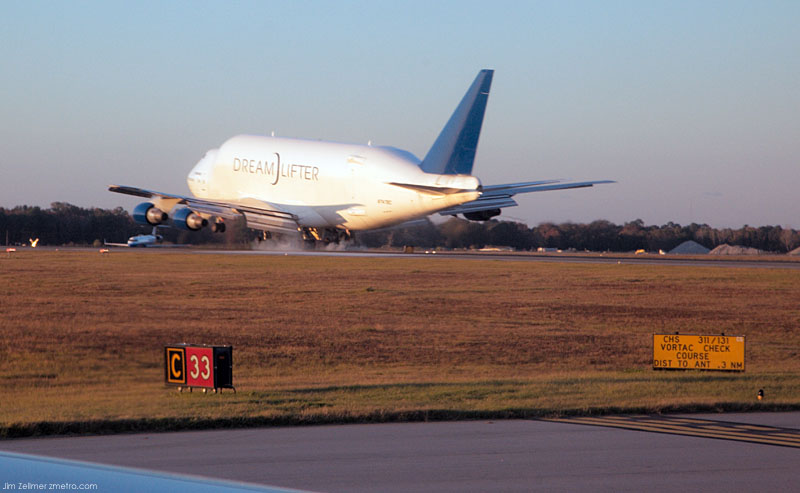
Kauai flowers at sunrise.
Category: Travel
Deicing Planes in Sarasota, Florida – using the Sun
Hundreds of travelers flying out of Florida’s Sarasota-Bradenton International were delayed by about by two hours Wednesday morning because of de-icing delays. Sort of.
The Sarasota Herald Tribune writes “airport officials grounded three planes because they had ice on the wings.” But, since below-freezing temperatures are so rare in central and south Florida, none of the airlines at Sarasota keep de-icing equipment at the airport.
Kauai Sunrise Panorama
 .
.
Click to view this panoramic scene.
Global Supply Chain for Boeing’s New 787: The DreamLifter in Action

With the recent first flight of Boeing’s new 787, I thought it timely to post a photo from it’s supply chain: a converted 747 freighter known as the “Dreamlifter” that flies parts from around the globe to Everett, Washington for final assembly.
Berlin’s Class War
Twenty years after it was toppled, the area around the Berlin Wall is becoming a battleground again. In the streets neighbouring Berlin’s Todesstreifen – the once heavily guarded “death strip” on the east side – a new conflict is brewing. This time, it is between wealthy newcomers to the German capital’s regenerated core, and less monied residents, who fear being displaced.
Silvia Kollitz, an anti-development activist, is a resident of Prenzlauer Berg, a once dilapidated but now chic district of east Berlin. She feels her local area, with its pretty, tree-lined streets and sleek cafés, is being turned into a refuge for the rich. “The new buildings being put up are just for people with lots of money – who don’t use state schools and look at the rest of us as ‘local colour’ from behind their locked gates and high walls,” she says.
While Kollitz and fellow activists are seeking to halt these changes, they are fighting a strong tide. For the first time since the second world war, Berlin is attracting the international wealthy. Shaking off its gloomy cold war past, the city’s rebuilt centre is now packed with designer emporia, five-star hotels – Berlin has more than New York – and restaurants, sandwiched between Prussian palaces and new ministry buildings.
Musée de l’Orangerie Panorama
Click to the image above to view this August, 2007 (hand held) panoramic image of Monet’s water lillies. Musée de l’Orangerie website. This journey and image made possible by the generosity of my parents!
St. Stephen’s Cathedral Panorama – Budapest
Wikipedia entry on St. Stephen’s, or Szent István Bazilika in Hungarian.
Our trip was made possible through the incredible generosity of my parents. We are truly blessed!
Madison’s Overture Center & MMOCA – A Panoramic View
‘Puzzlers’ reassemble shredded Stasi files, bit by bit
East German documents provide a crucial piece of history, supporters of the project say, but putting them back together could take hundreds of years. A computerized system would help, but it’s costly.
Reporting from Berlin and Zirndorf, Germany, – Martina Metzler peers at the piles of paper strips spread across four desks in her office. Seeing two jagged edges that match, her eyes light up and she tapes them together.
“Another join, another small success,” she says with a wry smile — even though at least two-thirds of the sheet is still missing.
Metzler, 45, is a “puzzler,” one of a team of eight government workers that has attempted for the last 14 years to manually restore documents hurriedly shredded by East Germany’s secret police, or Stasi, in the dying days of one of the Soviet bloc’s most repressive regimes.
Two decades after the heady days when crowds danced atop the Berlin Wall, Germany has reunited and many of its people have moved on. But historians say it is important to establish the truth of the Communist era, and the work of the puzzlers has unmasked prominent figures in the former East Germany as Stasi agents. In addition, about 100,000 people annually apply to see their own files.
God’s Glorious Fall Colors

On display in Madison today. A wonderful, sunny day after several rainy, cold episodes.

